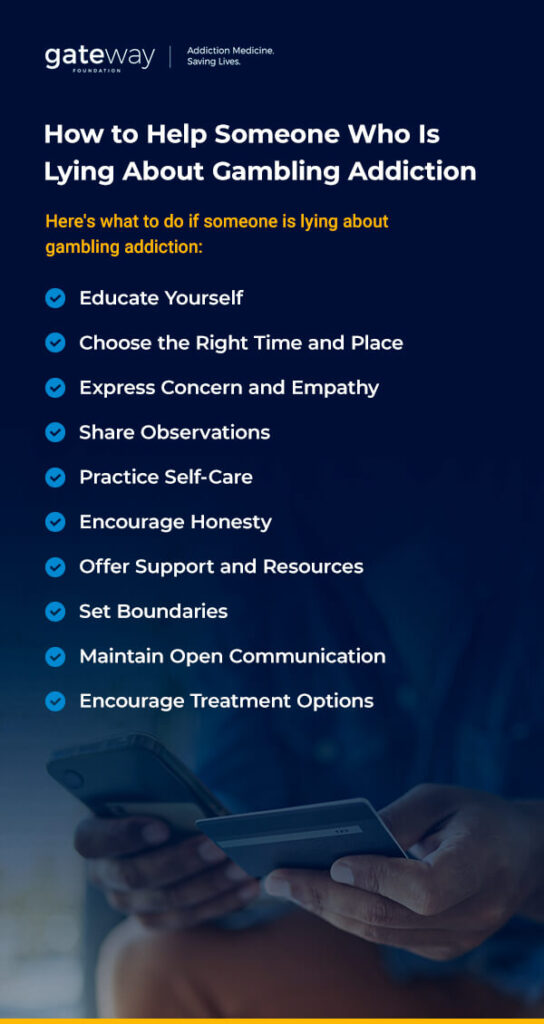- Jul 28
- Addiction

If your loved one demonstrates signs of compulsive gambling, you’re likely familiar with the cycle of lies, half-truths, and distortion of facts that come with this condition. If you’re unsure if your loved one has a gambling addiction, one of the signs that the behavior has become more than a casual occurrence includes lying about their gambling.
Learn more about common lies gamblers tell others and themselves and how to help someone with this addiction.
Why Do Compulsive Gamblers Lie?
While compulsive gambling can pose a significant problem for the gambler, it can also affect the people in their lives. While there are various reasons for strained relationships between gamblers and their loved ones, lying and cheating to sustain the addiction is often a tremendous cause.
Deception is often part of the mental health condition known as addiction, regardless of whether the pathology relates to drugs, alcohol, food, or betting.
So why do gamblers lie to those they love? There are many potential reasons for gambling and lying about it, such as:
- Denial: Many compulsive gamblers cannot admit the truth of their issue to anyone, even those closest to them. They may resort to “closing their eyes” to reality, hoping the problem will disappear. Some may feel intense shame about their gambling addiction, and denial may be a form of self-protection.
- False beliefs of redemption: Some compulsive gamblers are convinced that they are one move away from redeeming themselves and recouping their losses. They may believe their partner has no reason to be upset and cling to the belief that one more bet will be the “big win” that solves all their problems.
- Fear of rejection: Others deeply fear the consequences of telling the truth. They may believe their partner will leave them or that they could go to jail. Others may fear shame and ridicule from their social circle or employer. Telling the truth equates to public disclosure and the possibility of ridicule or rejection.
- Chasing a thrill: Compulsive gamblers struggle daily with stress and uncertainty. Anxiety about their lack of control over compulsive behavior can lead to constant stress and increased cortisol in the brain. Over time, the brain becomes attuned to the chemical imbalance, pushing for dopamine and serotonin to counter the cortisol. Gambling triggers a flood of serotonin and dopamine, countering the increased cortisol levels and making the gambler feel happy and even euphoric.
15 Lies People Addicted to Gambling May Tell
Whether lying about not having a problem or being in control of the situation, compulsive gamblers might attempt to misdirect or outright deceive their loved ones. Here are 15 lies gamblers might resort to as addiction takes hold:
1. “I’m Just Having Fun”
One of the most common lies told by people with gambling addiction is that they are simply engaging in harmless entertainment. They downplay the negative consequences and convince themselves that their excessive gambling is a source of enjoyment rather than an addiction spiraling out of control. Ultimately, this denial allows them to continue engaging in addictive behavior without acknowledging its impact on their lives.
2. “I Can Stop Anytime I Want”

Addicted gamblers often deceive themselves and others by asserting they have complete control over their gambling habits. They may believe they can quit gambling whenever they choose, though the problem is much more complex; they often require professional intervention to end the cycle. Admitting that they have lost control over their gambling can be difficult and embarrassing for problem gamblers. They may fear judgment from others or worry about the negative perception associated with addiction. Claiming they can stop any time they want allows them to maintain a façade of control and avoid confronting the need for help.
3. “I’m Due for a Win”
The belief that a big win is just around the corner is another lie frequently told by people with compulsive gambling issues. They convince themselves that their losses will eventually be offset by a significant jackpot, leading them to continue gambling despite mounting debts and financial hardships.
4. “I’m Gambling to Make Money”
Many people who participate in compulsive gambling try to justify their behavior by claiming they are skilled enough to profit from gambling. They might present themselves as in control of the situation when they are in a cycle of losses. For instance, a husband lying about gambling might try to justify their actions by telling their spouse they are gambling to pay for a vacation they always wanted to go on.
5. “I Only Gamble With Spare Money”
Addicted gamblers often attempt to minimize the extent of their problem by stating that they only gamble with money they can afford to lose. However, this line becomes increasingly blurred over time as they start using funds for essential expenses and borrowing money to fuel their addiction.
6. “I Just Need One More Bet to Recoup My Losses”
Problem gamblers may fall victim to the gambler’s fallacy, the mistaken belief that past outcomes influence future results in games of chance. They believe they will likely win in the next round if they have experienced a series of losses. This fallacy disregards the fundamental nature of gambling, which is based on independent events with random outcomes.
7. “I’m Not Hurting Anyone”
Addicted gamblers often underestimate the impact of their behavior on themselves and others. They claim that their gambling addiction doesn’t harm anyone else, unable to see or entirely disregarding the strain it puts on their relationships with family and friends, who may suffer financial, emotional, and psychological consequences.
8. “A Friend Needed Money”
Another common lie gamblers tell is that they have a friend in trouble who needs money fast. They may incorporate other people into their lies to explain why they don’t have money or avoid conflict with loved ones.
9. “I’m Just Borrowing Money Temporarily”

People with gambling addiction often resort to borrowing money from friends, family or even taking out loans to sustain the habit. They falsely promise to repay the borrowed funds quickly, intending to use any winnings to cover their debts. However, in most cases, the borrowed money is never repaid.
10. “I Don’t Have a Problem”
Perhaps the most pervasive lie that addicted gamblers tell is that they don’t have a problem and are in control of their gambling habits. It’s a significant hurdle for them to admit they need help. They may frequently assert they can overcome their addiction without professional intervention, underestimating the power and complexity that dependency and addiction can have on a person.
11. “I’m Just Unlucky”
Rather than accepting responsibility for their actions, addicted gamblers often blame their losses on bad luck. They attribute their lack of success to external factors or myths surrounding gambling, such as the idea that trying again after suffering a significant loss will lead to a win. Ultimately, these beliefs can perpetuate the cycle and reaffirm a compulsive gambler’s belief that their problems are due to external forces rather than their own choices.
12. “I’m Gambling to Escape My Problems”
Gambling addicts often use gambling to escape from underlying issues like stress, depression, or anxiety. They convince themselves that gambling provides a reprieve from their troubles, despite the fact that it exacerbates their problems in the long run.
13. “I’m Not Gambling That Much”
Downplaying the extent of their gambling is a common tactic employed by compulsive gamblers. These misrepresentations can stem from denial and the belief that they can stop whenever they choose. They underestimate the frequency and duration of their gambling sessions, minimizing the financial and emotional toll it takes on their lives. This lie can also stem from a deep shame and guilt about their addiction and their attempt to hide their behavior.
14. “I’ll Win It All Back Eventually”
Optimism can often push people further into gambling addiction. They might cling to believing they will eventually win back their losses, leading them to chase bigger bets and take more significant risks. Unfortunately, this mentality only deepens their financial and emotional distress. They might also convince themselves they have a foolproof strategy or system to guarantee success. They often cling to this belief to avoid facing the reality that gambling outcomes are determined mainly by chance, not skill or strategy.
15. “I’ll Never Gamble Again”
When people cite a girlfriend or boyfriend lying about gambling, they often express how their partner falsely promised to quit. Usually, the gambler has just suffered a significant loss, legal entanglement, or another severe consequence due to their gambling. They may tell this lie to avoid going for treatment or admitting the extent of their struggles.
In many cases, compulsive gamblers genuinely believe they will quit—however, because of how addiction affects the brain, many will relapse into their addiction without the proper support and guidance.
How to Help Someone Who Is Lying About Gambling Addiction

When someone struggles with gambling addiction, it can be challenging to confront the issue, especially when they conceal their struggles. Compulsive gamblers often resort to dishonesty to protect themselves and may deny or downplay the severity of their problem. However, supporting and encouraging them to seek professional help is crucial. You can also take steps to protect your own mental health and well-being.
Here’s what to do if someone is lying about gambling addiction:
Educate Yourself
Before approaching the person, educate yourself about gambling addiction. Understand its signs, symptoms, and the impact it can have on individuals and their loved ones. While it doesn’t mitigate the hurt of being lied to by someone you love, understanding the complex and connected physical and emotional issues faced by compulsive gamblers can help you approach the situation with empathy and understanding.
Choose the Right Time and Place
Find an appropriate time and private setting to have an open and honest conversation with the person. Avoid confrontational or public situations that may escalate tension or embarrassment. Ensure they feel comfortable and safe during the discussion.
Express Concern and Empathy
Start the conversation by expressing your concern for their well-being. Use “I” statements to avoid sounding accusatory. Let them know that you care about them and are there to support them through this challenging time. It helps to take a compassionate tone and let your loved one know that they are in a safe space to discuss their situation.
Share Observations
Gently point out the discrepancies or inconsistencies you have noticed in their behavior or finances. Be specific but non-judgmental. Present concrete evidence, such as bank statements or credit card bills showing gambling-related transactions, if possible. Avoid sounding accusatory and rather be realistic and straightforward about their behavior change.
Practice Self-Care
Supporting someone with a gambling addiction can be emotionally draining. Take care of yourself by seeking support from friends, family, or support groups. Maintain your regular hobbies and take care of your physical and emotional health. Educate yourself about codependency and seek professional help if needed.
Encourage Honesty
Tell them that you understand addiction is a powerful force and that lying is a common defense mechanism. Encourage them to be honest with themselves and with you. Assure them that you are there to listen without judgment and want to help. Accept what you hear and reward honesty.
Offer Support and Resources
Provide information about available resources such as local support groups, helplines, or addiction counselors. Offer to accompany them to meetings or appointments if they feel comfortable. Emphasize that professional help can make a significant difference in their recovery journey.
Set Boundaries
While supporting them, it is essential to establish and maintain healthy boundaries. Be clear about what you are willing and able to provide regarding support. Avoid enabling their addiction by not bailing them out of financial trouble or participating in their gambling activities. Setting boundaries can also prevent the problem from significantly impacting your mental and emotional health.
Maintain Open Communication
Continue to communicate openly and honestly with the person as they navigate their recovery journey. Encourage them to share their progress, setbacks, and challenges they may face along the way. Be a non-judgmental source of understanding and encourage open communication so your loved one feels validated and supported.
Encourage Treatment Options
Suggest different treatment options to help your loved one with gambling addiction. At Gateway Foundation, we offer counseling and comprehensive treatment programs specifically designed for gambling addiction. Professionals can help those affected by this condition address underlying issues driving their behavior. Emphasize the importance of seeking professional help in addressing the underlying issues driving their addictive behavior.
Get Compassionate Gambling Addiction Treatment at Gateway Foundation
Recognizing common lies, gamblers tell is essential for understanding the depth of the problem and encouraging them to seek help. It’s crucial to address this issue with compassion and support, providing resources and treatment options to help individuals break free from the grip of addiction. You can also benefit from addressing your concerns in a safe, discreet environment and learning coping strategies to improve your peace of mind — whether the gambler seeks help.
At Gateway Foundation, we provide treatment options for individuals and their families impacted by gambling addiction. Our programs include holistic and evidence-based therapies, dual diagnosis treatment, support groups, and other services to make up a comprehensive treatment program.
To learn more about our gambling addiction treatment, contact us today.



